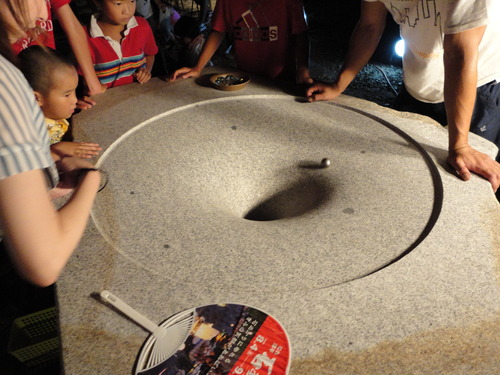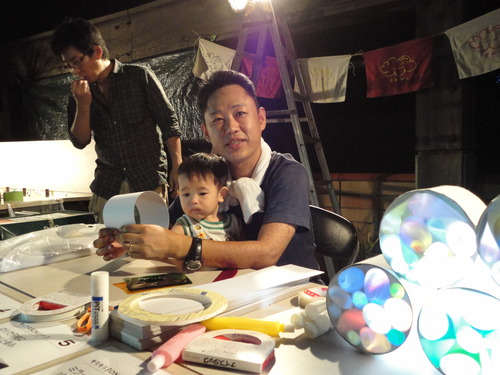2012年08月31日
Stone Lantern Festival
Mure in east Takamatsu offers a very family-friendly event every summer—Ishi Akari or “Stone Lantern” Road. From early August to mid-September, one long village street is transformed into a fantasy of lights.

Mure area has a long history of stone working and quarrying that dates back to at least the 14th century. In recent times, the quality of workmanship has drawn such well-known artists as Isamu Noguchi and Nagare Masayuki to establish studios here. With this technical and creative heritage, it’s not surprising that the local people came up with a unique festival all their own.

From early August to mid September, local residents decorate the outside of their homes with original stone lanterns.

Seashell lantern

Shaved ice treat in stone and glass

Crocodile lantern

One Piece lantern
Many of the attractions offer chances for visitors to express their creativity, such as make-your-own Kira-kira Boxes (JPY300),

this set of stone blocks for assembling one’s own lantern,

and the make-your-own portable lanterns below.

When clipped onto a belt, these lanterns made children easy for parents and drivers to see in the dark.
Some stonemasons had made a great lottery machine. The ball rolls around the center until it falls into the hole and out one of three different colored pipes. Prizes await, hence the intense expressions on the players’ faces.

Some deft craftsman made these fancy rubber band guns to shoot for prizes.


I was very impressed by the community spirit. Here are members of just one group that was very involved in the festival.

Called Murebito (which sounds like “person from Mure” but uses Chinese characters that mean “dream promoters”) the group is comprised of young artists, craftsmen and professionals and is offering weekend festival workshops that everyone can enjoy. On the last day (September 15, 2012) of the Stone Lantern event, Murebito will host a workshop by a silver accessory artist in which squid “bones” will be used as molds. Fun!
The lantern road is open for viewing from sunset to 10PM daily from August 4 to September 17, 2012.
Access, etc.: Take the Kotoden train (Shido line) from Kawaramachi Station to Yakuri Station (20 min., JYP310 one-way). The lanterns start south of Kotoden Yakuri Station and stretch for about 1 km down the old Aji Road. The lanterns make it easy to follow. On the weekends, there are many helpful volunteers to guide and some serving free iced barley tea partway down. There’s food and refreshment to be bought as well. If you’re going by car, there is plenty of free parking along the new Aji road south of the Marunaka shopping center on the left before the next stoplight and some more if you turn right at that stoplight and go down to the event entrance.
Mure area has a long history of stone working and quarrying that dates back to at least the 14th century. In recent times, the quality of workmanship has drawn such well-known artists as Isamu Noguchi and Nagare Masayuki to establish studios here. With this technical and creative heritage, it’s not surprising that the local people came up with a unique festival all their own.
From early August to mid September, local residents decorate the outside of their homes with original stone lanterns.
Seashell lantern
Shaved ice treat in stone and glass
Crocodile lantern
One Piece lantern
Many of the attractions offer chances for visitors to express their creativity, such as make-your-own Kira-kira Boxes (JPY300),
this set of stone blocks for assembling one’s own lantern,
and the make-your-own portable lanterns below.
When clipped onto a belt, these lanterns made children easy for parents and drivers to see in the dark.
Some stonemasons had made a great lottery machine. The ball rolls around the center until it falls into the hole and out one of three different colored pipes. Prizes await, hence the intense expressions on the players’ faces.
Some deft craftsman made these fancy rubber band guns to shoot for prizes.
I was very impressed by the community spirit. Here are members of just one group that was very involved in the festival.
Called Murebito (which sounds like “person from Mure” but uses Chinese characters that mean “dream promoters”) the group is comprised of young artists, craftsmen and professionals and is offering weekend festival workshops that everyone can enjoy. On the last day (September 15, 2012) of the Stone Lantern event, Murebito will host a workshop by a silver accessory artist in which squid “bones” will be used as molds. Fun!
The lantern road is open for viewing from sunset to 10PM daily from August 4 to September 17, 2012.
Access, etc.: Take the Kotoden train (Shido line) from Kawaramachi Station to Yakuri Station (20 min., JYP310 one-way). The lanterns start south of Kotoden Yakuri Station and stretch for about 1 km down the old Aji Road. The lanterns make it easy to follow. On the weekends, there are many helpful volunteers to guide and some serving free iced barley tea partway down. There’s food and refreshment to be bought as well. If you’re going by car, there is plenty of free parking along the new Aji road south of the Marunaka shopping center on the left before the next stoplight and some more if you turn right at that stoplight and go down to the event entrance.
My Profile
Cathy Hirano キャシー ヒラノ
I've lived in Japan since 1978. After graduating from a Japanese university with a BA in cultural anthropology in 1983, I worked as a translator in a Japanese consulting engineering firm in Tokyo for several years. My Japanese husband and I moved to Takamatsu in 1987 to raise our two children in a slower-paced environment away from the big city pressures. We've never regretted it. I work as a freelance translator and interpreter and am involved in a lot of community work, including volunteering for Second Hand, a local NGO that supports educational and vocational training initiatives in Cambodia, and for the Takamatsu International Association. I love living in Takamatsu.
Cathy Hirano キャシー ヒラノ
I've lived in Japan since 1978. After graduating from a Japanese university with a BA in cultural anthropology in 1983, I worked as a translator in a Japanese consulting engineering firm in Tokyo for several years. My Japanese husband and I moved to Takamatsu in 1987 to raise our two children in a slower-paced environment away from the big city pressures. We've never regretted it. I work as a freelance translator and interpreter and am involved in a lot of community work, including volunteering for Second Hand, a local NGO that supports educational and vocational training initiatives in Cambodia, and for the Takamatsu International Association. I love living in Takamatsu.
Posted by cathy at 11:36│Comments(0)
※会員のみコメントを受け付けております、ログインが必要です。





